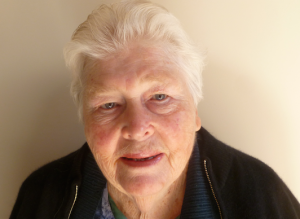GREG Cornwell suggests (CN, July 16) there should be a referendum on the “right to die”. One thing I can assure him is that no referendum will prevent him or anyone else from dying. We all know that death is inevitable.

Bev Cains.
In the US these people have been described by disability advocates as the “Four Ws” – white, well-off and the worried-well.
They are usually oblivious to the effect of their demands on the rest of society. However, the disability advocates are one group who can recognise the threat to their welfare and how they could be marginalised.
It is not only Greg’s fellow “oldies” or the disabled who will suffer if euthanasia and assisted suicide are introduced.
Both would sabotage the caring nature of the health professions. They could also give rise to feelings by the seriously ill that they are a “burden” on their fellow humans.
It would also sabotage society’s efforts at suicide prevention. All states and territories recognise the suicide rate as something that needs to be reduced and all of them allocate taxpayers’ funds in trying to prevent suicide, particularly among the young.
The assisted suicide and euthanasia lobby in Australia promote the use of a drug used in the veterinary industry to euthanase animals as their drug of choice. They want it to be available to them “just in case”.
Between July 2000 and December 2012, 120 Australians (and probably many uncounted others) used this drug to kill themselves. Twenty-six were under 40 years of age.
There is really no distinction between promoting “assisted suicide” and promoting any form of suicide, whether by the elderly or the young.
Those who want to have assisted suicide and euthanasia available to themselves “just in case” and so they can be in total control of their death, are responsible for an overall reduction in society’s respect for life.
Greg’s fear is of an end-of-life situation that is “undignified, [in] often painful circumstances, immobile, incontinent, and unconsulted”.
Hasn’t he heard of palliative care?
We in Canberra are fortunate to have access to some of the best palliative care and supportive services in Australia, including the holistic support provided by the hospice at Clare Holland House and its wonderful volunteers.
No one is claiming that absolutely all pain will be controlled at the end of life, or that everyone will have a peaceful passing, but the “horror stories” about death that one often hears about most likely occurred in another era or in the absence of access to good end of life care.
These “horror stories” should not be used as emotional blackmail to send Australia in the direction of Belgium and the Netherlands where, under their liberal euthanasia and assisted suicide laws, people can ask for and receive euthanasia just because they are depressed or tired of living.
Bev Cains is a former Family Team member of the pre-self government ACT House of Assembly (1979-86).
The post Cains / Not to die, it’s the right to live! appeared first on Canberra CityNews.



















